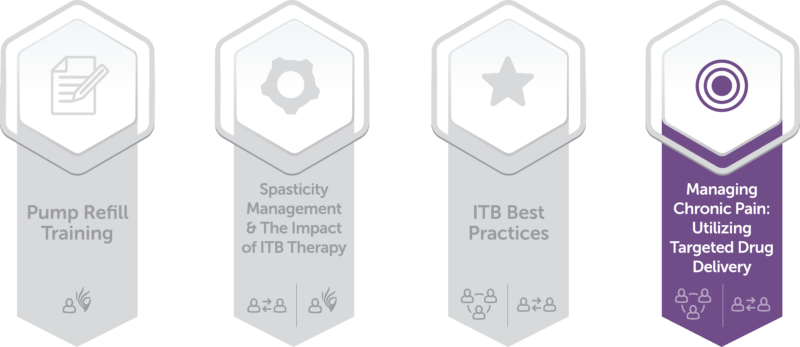TDD and ITB Therapy Training and Education programs
In partnership with our sister brand, Gablofen®, and parent company, Piramal Critical Care, we are pleased to offer on-site training, educational materials on best-use practices, and ongoing support for clinicians, nurses, and pharmacists using Targeted Drug Delivery (TDD) or Intrathecal Baclofen (ITB) Therapy to manage their patients’ chronic pain or spasticity.
*Education programs, trials, and materials including brochures, videos, and webinars, are only available for US-based companies.
Advancing IT Therapy: Empowerment Through Education
Advancing IT Therapy: Empowerment Through Education is Piramal Critical Care’s four-session, unbranded educational program. With the goal of improving clinical experiences and patient outcomes through expanded treatment options, this program and its training materials are designed to educate clinicians, physical and occupational therapists, and other medical professionals on a series of spasticity- and pain-related topics.
The session “Managing Chronic Pain: Utilizing Targeted Drug Delivery”, is most relevant for TDD providers. However, every session is full of useful information that can enhance your overall IT Therapy offerings. The sessions can be completed individually or as a series and can be taken at any time, in any order.

Programs can be delivered through:

Collegial
Roundtables

Piramal Critical Care Representative
 Peer-to-Peer
Peer-to-Peer
Sessions
*A certificate of attendance will be provided per each course for educational training records*
Schedule a Personalized Training Session
If you are interested in learning more about our education programs or you would like to schedule a training session, fill out the form and a representative will be in touch.
*Education programs, trials, and materials including brochures, videos, and webinars, are only available for US-based companies.
Important Risk Information
INDICATIONS AND USAGE
MITIGO™ (Morphine Sulfate Injection, USP – Preservative-free) is an opioid agonist, for use in continuous microinfusion devices and indicated only for intrathecal or epidural infusion in the management of intractable chronic pain severe enough to require an opioid analgesic and for which alternative treatments are inadequate.
IMPORTANT RISK INFORMATION
WARNING: RISKS WITH NEURAXIAL ADMINISTRATION; LIFE-THREATENING RESPIRATORY DEPRESSION; RISK OF ADDICTION, ABUSE, AND MISUSE; NEONATAL OPIOID WITHDRAWAL SYNDROME; and RISKS FROM CONCOMITANT USE WITH BENZODIAZEPINES OR OTHER CNS DEPRESSANTS
See full prescribing information for complete boxed warning.
- Single-dose neuraxial administration may result in acute or delayed respiratory depression up to 24 hours. Because of the risk of severe adverse reactions when MITIGO is administered by the epidural or intrathecal route of administration, patients must be observed in a fully equipped and staffed environment for at least 24 hours after the initial dose.
- Serious, life-threatening, or fatal respiratory depression may occur. Monitor closely, especially upon initiation or following a dose increase. Patients must be observed in a fully equipped and staffed environment for at least 24 hours after each test dose and, as indicated, for the first several days after surgery.
- MITIGO exposes users to risks of addiction, abuse, and misuse, which can lead to overdose and death. Assess patient’s risk before prescribing and monitor regularly for these behaviors and conditions.
- Prolonged use of MITIGO during pregnancy can result in neonatal opioid withdrawal syndrome, which may be life-threatening if not recognized and treated. If prolonged opioid use is required in a pregnant woman, advise the patient of the risk of neonatal opioid withdrawal syndrome and ensure that appropriate treatment will be available.
- Concomitant use of opioids with benzodiazepines or other central nervous system (CNS) depressants, including alcohol, may result in profound sedation, respiratory depression, coma, and death. Reserve concomitant prescribing for use in patients for whom alternative treatment options are inadequate; limit dosages and durations to the minimum required; and follow patients for signs and symptoms of respiratory depression and sedation.
CONTRAINDICATIONS
- Significant respiratory depression
- Acute or severe bronchial asthma in an unmonitored setting in absence of resuscitative equipment
- Concurrent use of monoamine oxidase inhibitors (MAOIs) or use of MAOIs within the last 14 days
- Known or suspected gastrointestinal obstruction, including paralytic ileus
- Hypersensitivity or intolerance to morphine
Neuraxial administration of MITIGO is contraindicated in patients with:
- Infection at the injection microinfusion site
- Concomitant anticoagulant therapy
- Uncontrolled bleeding diathesis
- The presence of any other concomitant therapy or medical condition which would render epidural or intrathecal administration of medication especially hazardous.
WARNINGS AND PRECAUTIONS
- Risk of Inflammatory Masses: Monitor patients receiving continuous infusion of MITIGO via indwelling intrathecal catheter for new signs or symptoms of neurologic impairment.
- Risk of Tolerance and Myoclonic Activity: Monitor patients for unusual acceleration of neuraxial morphine, which may cause myoclonic-like spasm of lower extremities. Detoxification may be required.
- Life-Threatening Respiratory Depression in Patients with Chronic Pulmonary Disease or in Elderly, Cachectic, or Debilitated Patients: Monitor closely, particularly during initiation and titration.
- Adrenal Insufficiency: If diagnosed, treat with physiologic replacement of corticosteroids, and wean patient off of the opioid.
- Severe Hypotension: Monitor during dosage initiation and titration. Avoid use of MITIGO in patients with circulatory shock.
- Risks of Use in Patients with Increased Intracranial Pressure, Brain Tumors, Head Injury, or Impaired Consciousness: Monitor for sedation and respiratory depression. Avoid use of MITIGO in patients with impaired consciousness or coma.
ADVERSE REACTIONS
Most serious adverse reactions were respiratory depression, apnea, circulatory depression, respiratory arrest, shock, and cardiac arrest. Other common frequently observed adverse reactions include: sedation, lightheadedness, dizziness, nausea, vomiting, and constipation.
USE IN SPECIFIC POPULATIONS
- Pregnancy: May cause fetal harm.
- Hepatic and Renal Impairment: May affect the metabolism and excretion of MITIGO.
To report SUSPECTED ADVERSE REACTIONS, contact Piramal Critical Care, Inc. at 1-888-822-8431 or FDA at 1-800-FDA-1088 or www.fda.gov/medwatch.
For additional Important Risk Information, including boxed warning, see enclosed Full Prescribing Information.
INDICATIONS AND USAGE
MITIGO™ (Morphine Sulfate Injection, USP – Preservative-free) is an opioid agonist, for use in continuous microinfusion devices and indicated only for intrathecal or epidural infusion in the management of intractable chronic pain severe enough to require an opioid analgesic and for which alternative treatments are inadequate.
IMPORTANT RISK INFORMATION
WARNING: RISKS WITH NEURAXIAL ADMINISTRATION; LIFE-THREATENING RESPIRATORY DEPRESSION; RISK OF ADDICTION, ABUSE, AND MISUSE; NEONATAL OPIOID WITHDRAWAL SYNDROME; and RISKS FROM CONCOMITANT USE WITH BENZODIAZEPINES OR OTHER CNS DEPRESSANTS
See full prescribing information for complete boxed warning.
- Single-dose neuraxial administration may result in acute or delayed respiratory depression up to 24 hours. Because of the risk of severe adverse reactions when MITIGO is administered by the epidural or intrathecal route of administration, patients must be observed in a fully equipped and staffed environment for at least 24 hours after the initial dose.
- Serious, life-threatening, or fatal respiratory depression may occur. Monitor closely, especially upon initiation or following a dose increase. Patients must be observed in a fully equipped and staffed environment for at least 24 hours after each test dose and, as indicated, for the first several days after surgery.
- MITIGO exposes users to risks of addiction, abuse, and misuse, which can lead to overdose and death. Assess patient’s risk before prescribing and monitor regularly for these behaviors and conditions.
- Prolonged use of MITIGO during pregnancy can result in neonatal opioid withdrawal syndrome, which may be life-threatening if not recognized and treated. If prolonged opioid use is required in a pregnant woman, advise the patient of the risk of neonatal opioid withdrawal syndrome and ensure that appropriate treatment will be available.
- Concomitant use of opioids with benzodiazepines or other central nervous system (CNS) depressants, including alcohol, may result in profound sedation, respiratory depression, coma, and death. Reserve concomitant prescribing for use in patients for whom alternative treatment options are inadequate; limit dosages and durations to the minimum required; and follow patients for signs and symptoms of respiratory depression and sedation.
CONTRAINDICATIONS
- Significant respiratory depression
- Acute or severe bronchial asthma in an unmonitored setting in absence of resuscitative equipment
- Concurrent use of monoamine oxidase inhibitors (MAOIs) or use of MAOIs within the last 14 days
- Known or suspected gastrointestinal obstruction, including paralytic ileus
- Hypersensitivity or intolerance to morphine
Neuraxial administration of MITIGO is contraindicated in patients with:
- Infection at the injection microinfusion site
- Concomitant anticoagulant therapy
- Uncontrolled bleeding diathesis
- The presence of any other concomitant therapy or medical condition which would render epidural or intrathecal administration of medication especially hazardous.
WARNINGS AND PRECAUTIONS
- Risk of Inflammatory Masses: Monitor patients receiving continuous infusion of MITIGO via indwelling intrathecal catheter for new signs or symptoms of neurologic impairment.
- Risk of Tolerance and Myoclonic Activity: Monitor patients for unusual acceleration of neuraxial morphine, which may cause myoclonic-like spasm of lower extremities. Detoxification may be required.
- Life-Threatening Respiratory Depression in Patients with Chronic Pulmonary Disease or in Elderly, Cachectic, or Debilitated Patients: Monitor closely, particularly during initiation and titration.
- Adrenal Insufficiency: If diagnosed, treat with physiologic replacement of corticosteroids, and wean patient off of the opioid.
- Severe Hypotension: Monitor during dosage initiation and titration. Avoid use of MITIGO in patients with circulatory shock.
- Risks of Use in Patients with Increased Intracranial Pressure, Brain Tumors, Head Injury, or Impaired Consciousness: Monitor for sedation and respiratory depression. Avoid use of MITIGO in patients with impaired consciousness or coma.
ADVERSE REACTIONS
Most serious adverse reactions were respiratory depression, apnea, circulatory depression, respiratory arrest, shock, and cardiac arrest. Other common frequently observed adverse reactions include: sedation, lightheadedness, dizziness, nausea, vomiting, and constipation.
USE IN SPECIFIC POPULATIONS
- Pregnancy: May cause fetal harm.
- Hepatic and Renal Impairment: May affect the metabolism and excretion of MITIGO.
To report SUSPECTED ADVERSE REACTIONS, contact Piramal Critical Care, Inc. at 1-888-822-8431 or FDA at 1-800-FDA-1088 or www.fda.gov/medwatch.
For additional Important Risk Information, including boxed warning, see enclosed Full Prescribing Information.